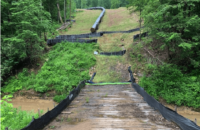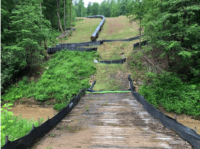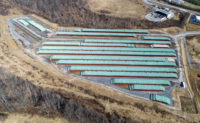The federal Court of Appeals in Richmond, Va., set back the $6.2-billion Mountain Valley natural gas pipeline as it nears completion in Virginia and West Virginia, when judges on Jan. 25 tossed out federal agency environmental approvals of a project water crossing in a national forest—for the second time—saying they failed to take into account “real world data.”
The court previously sent assessments by the U.S. Forest Service and the U.S. Interior Dept.'s Bureau of Land Management back to the agencies for violations of the National Environmental Policy Act. “We directed the Forest Service to more thoroughly analyze the pipeline’s sedimentation impacts,” the court said.
A new supplemental impact review prepared by the agencies used two hydrological analyses provided by Mountain Valley Partners, the project developers, but it did not consider U.S. Geological Survey water-quality monitoring data that showed water turbidity values 20% higher downstream of the pipeline’s construction than upstream—“a significant difference from the 2.1% increase in sedimentation the hydrologic analyses predicted for the Roanoke River,” the court said.
In not including the USGS data, the agencies "entirely failed to consider an important aspect of the problem,” the court said, adding that the omission means "modeling used in the EIS may not be consistent with ... the actual impact of the pipeline and its construction.”
The 304-mile project is nearly fully built but awaits permits to cross a 3.5-mile area of the Jefferson National Forest in Virginia, among other approvals. The line was originally set to finish in 2018 at a cost of $3.7 billion.
The pipeline is a joint venture of EQM Midstream Partners LP; NextEra Capital Holdings Inc.; Con Edison Transmission Inc.; WGL Midstream; and RGC Midstream LLC.
Precision Pipeline, a subsidiary of energy contractor MasTec, is building the project. Mountain Valley Partners would not confirm other members of the construction team.
The Federal Energy Regulatory Commission approved the project in October 2017, and allowed construction to continue despite challenges by the Sierra Club and other environmental groups in several courts.
FERC’s approval survived legal challenges, but now the agency must consider the owners' request to change its stream-crossing method. FERC’s ruling could be guided by a new agency pipeline policy expected to require stricter project reviews. The new guidance, developed under the commission's 3-2 Democrat majority, is expected within weeks.
Ultimately the question is whether the project will obtain federal permits and construction will finish. The agencies will consider environmental effects again, but this time under the Biden administration. Mountain Valley's two previous environmental reviews were prepared during the Trump administration.
Project completion would be a major win for the industry, Bloomberg Law says, noting that developers' ability to lock in contracts with several shippers that are standing by the project through its legal challenges confirms consumer interest.
At least one industry analyst gives the project just a 5% probability of being cancelled.
Environmental groups say the pipeline is not needed, and that several major northeast gas projects were recently cancelled—including the 116-mile PennEast Pipeline from Pennsylvania to New Jersey; the 600-mile Atlantic Coast pipeline from West Virginia to North Carolina; and the 121-mile Constitution pipeline, which would have run from northeast Pennsylvania to central New York.






Post a comment to this article
Report Abusive Comment